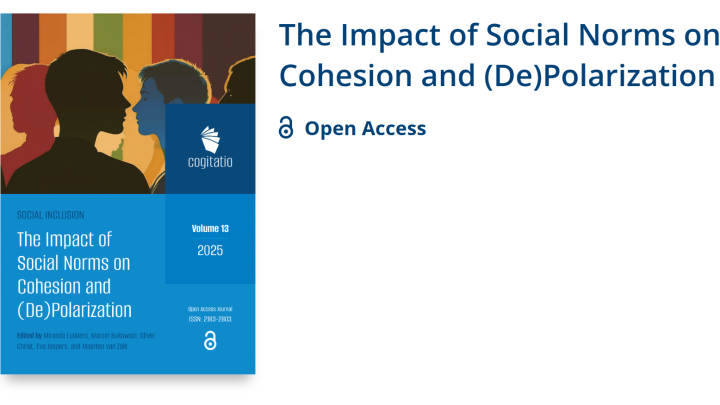The special issue we edited for the INCLUSIVITY project, “The Impact of Social Norms on Cohesion and (De)Polarization,” has just been published in the journal Social Inclusion. In a time of growing polarization, this collection explores whether—and how—social norms can shape intergroup dynamics in polarized contexts, and considers the potential for interventions to counter polarization.
The issue was guest-edited by Miranda Lubbers, Marcin Bukowski, Oliver Christ, Eva Jaspers, and Maarten van Zalk, the principal investigators of the INCLUSIVITY project. It features 12 articles by authors from Germany, the Netherlands, Poland, and Spain, addressing four central themes:
- The role of social norms in fostering tolerance and depolarization;
- The relationship between norm deviations, non-normative behaviors, and political polarization;
- How competing groups negotiate or contest social norms;
- The influence of social networks on intergroup attitudes and behaviors that can facilitate depolarization.
We are delighted with the outcome of this special issue and hope it will inspire further research and discussion!
Contents:
The Impact of Social Norms on Cohesion and (De)Polarization Miranda J. Lubbers, Marcin Bukowski, Oliver Christ, Eva Jaspers and Maarten van Zalk
Testing the Robustness of the Association Between Personal Respect Norms and Tolerance in Polarized Contexts Lucía Estevan-Reina, Laura Frederica Schäfer, Wilma Middendorf, Marcin Bukowski, Maarten van Zalk and Oliver Christ
Mind the Gap! Linking Equality‐Based Respect Norms with General and Specific Tolerance Dominika Gurbisz, Anna Potoczek, Marcin Bukowski, Lucía Estevan-Reina and Oliver Christ
Living Up to Your Own Standards? Patterns of Civic Norms and Volunteering in Germany Kathrin Ackermann, Jonathan Mylius, Annette Haussmann and Stefanie Wiloth
How Descriptive Norms and Peer Attitudes Shape Interethnic Dating Among Adolescents in Dutch Schools Eva Jaspers, Pascale I. van Zantvliet and Jan-Willem Simons
Youth Norm Deviation and Intolerance: Pathways to Polarized Political Attitudes and Behavioral Intentions Sebastian Lutterbach and Andreas Beelmann
Associations Between Perceived Societal Polarisation and (Extreme) Non‐Normative Attitudes and Behaviour Rebekka Kesberg, Allard R. Feddes, Eva Vogel and Bastiaan T. Rutjens
(Micro)Identities in Flux: The Interplay of Polarization and Fragmentation in Polish and European Politics Piotr Kłodkowski, Malgorzata Kossowska and Anna Siewierska
“Funny Weapons”: The Norms of Humour in the Construction of Far‐Right Political Polarisation Gabriel Bayarri Toscano and Concepción Fernández-Villanueva
The More, the Merrier…: The Effect of Social Network Heterogeneity on Attitudes Toward Political Opponents Paulina Górska, Dominika Bulska and Maciej Górski
Longitudinal Associations Between Perceived Inclusivity Norms and Opinion Polarization in Adolescence Maor Shani, Marjorie Berns, Lucy Bergen, Stefanie Richters, Kristina Krämer, Sophie de Lede and Maarten van Zalk





